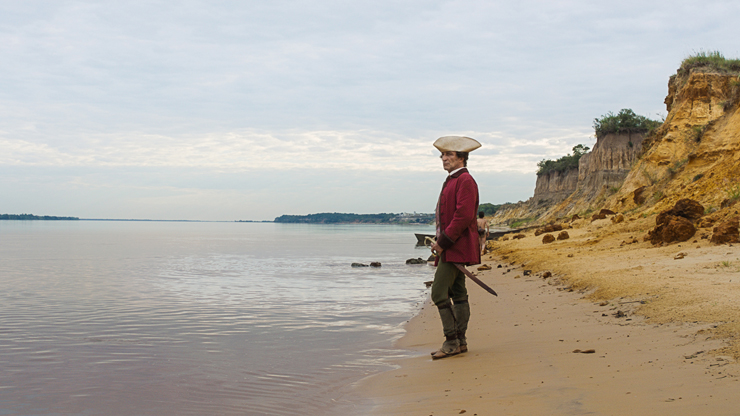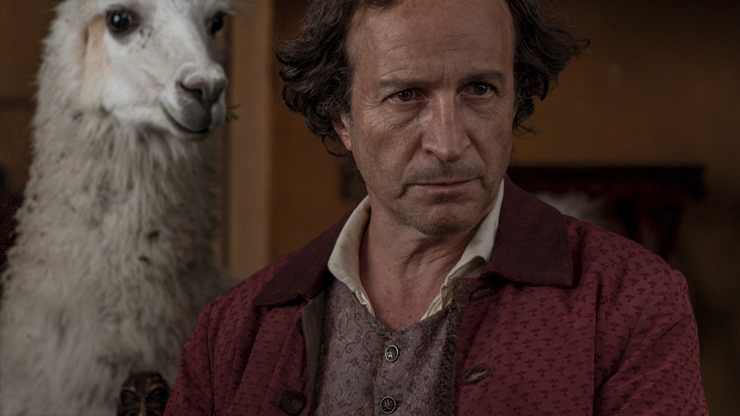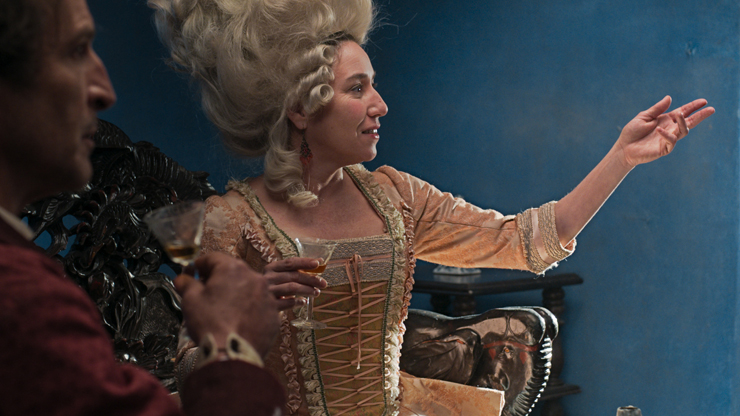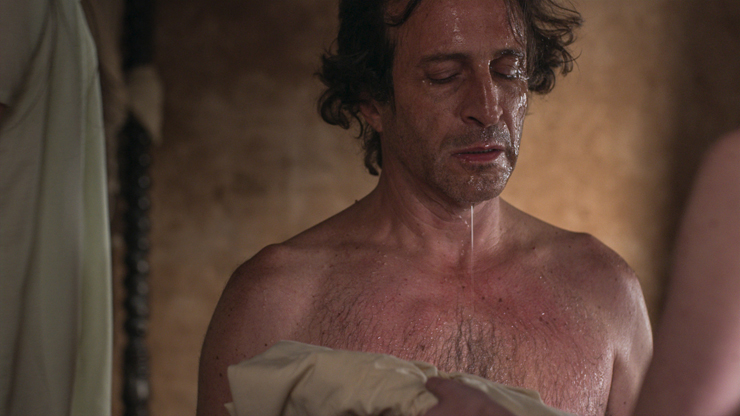Picture the scene. You run into your old history professor at some work conference. He gave you an “A-” in his class, and you feel prouder of that grade than any straight “A” you ever got in college because you worked your butt off and he was, um, let's just say challenging.
But it's clear you enjoyed each other's company, because this feels like reuniting with an old friend. “Let's go have a drink,” he suggests, and at the time nothing would feel more satisfying than to reminisce and catch up with the cantankerous teacher who, in all honesty, you always sensed was more subversive underneath that strait-laced exterior than he let on.

Daniel Giménez Cacho.
Photo courtesy Strand Releasing.
One old-fashioned suddenly becomes three. (Wait, was that what he was drinking?) And the conversation shifts to Latin American history. He confesses he's always wanted to teach a specialized course in colonialism in the Americas. You ask why it never happened. He gives you this strange look and says, “If I were to convey to my students how it really felt for those Spaniards, and on top of that go into exacting detail as to how the aborigenes were decimated, my students would have wanted to blow their brains out.”
He cocks his head to the side, appears to pause for dramatic effect, and whispers a single word: “Zama.”

Photo courtesy Strand Releasing.
You catch yourself before asking who on earth he's talking about, because you don't want to come across as clueless on the subject. His eyes then light up, as if understanding you have no idea what he just said, and he softly says, “Close your eyes.”
You hesitate, but you do as he says.
“Sounds pleasant enough,” you chime in, a goofy grin spreading across your face.
“This sounds terrible. But surely things have to begin looking up for this dude,” you say, aware you slurred that last part.
Your former, now very tipsy history professor stifles a giggle, then says, “This is the nice part of the story.”
That voice in your head wags its finger at you, saying, “See what you did? It's too late to turn back now.”

Daniel Giménez Cacho.
Photo courtesy Strand Releasing.
And so it goes with “Zama,” a potent but deeply unpleasant costume drama from Argentinian filmmaker Lucrecia Martel. Watching this vicious, unvarnished portrait of decaying colonialists fighting to hold on to power in a treacherous and constantly shifting landscape is not unlike a drunken conversation with an opinionated scholar that becomes harder and harder to take the more wasted you get.
Martel (“La Ciénaga, “The Headless Woman”) takes no prisoners in her adaptation of Antonio di Benedetti's 1956 historical novel, her first film in nine years. Ravishing imagery coaxes viewers into immersing themselves into the meticulously rendered landscapes, only to have a gallery of horrors unleashed on them piecemeal, rather like that absorbing potboiler you can't put down even as it makes your skin crawl. Clumsy political maneuvering leads to emasculating humiliation before the movie plunges you down a rabbit hole of soul-crushing brutality.
At its center is the hapless title character. To say Don Diego de Zama (Ben Gazzara lookalike Daniel Giménez Cacho) can't catch a break would be an understatement. A magistrate to the Spanish crown (“corregidor” is his actual position), it's evident his heart is no longer in executing his duties in a small colony located in Paraguay. His once elegant powdered wig now looks like a sewer rat, and he doesn't even bother to put it on properly. Promises to be transferred to a less remote location (and a better position) appear to have fallen on deaf ears.

Daniel Giménez Cacho, Lola Dueñas.
Photo courtesy Strand Releasing.
Whether Zama is defending young women's honor from a horned up robber or engaging in fisticuffs with an assistant magistrate who mocks him, he can't escape the (rather brazen) whispers. He may have been known once upon a time as the “pacifier of Indians,” but now he spends his days fighting a losing battle for his reputation and his nights frequenting a bordello. (He opts not to indulge in the offerings because, as someone points out, his taste leans toward white women.) Naturally, he still misses his wife and children.
But not enough to lust after Luciana Piñares de Luenga (Almodóva regular Lola Dueñas, wife of a high-ranking official, who doesn't shy away from indulging the “corregidor's” attention while stopping just shy of giving him what he hungers for. Meanwhile, growing concern over Zama's bête noire, the villainous scoundrel Vicuña Porto, has the disenchanted quill pusher going into damage control mode, denying the notorious bandit is still alive.
It's an intoxicating web Martel weaves, not the kind that casts a spell, but the one that makes you want to reach for the smelling salts. It's an acid trip gone horribly wrong. A voyage back in time that makes you sick to your stomach. A tour of the countryside that leaves you stranded in hostile territory.
Rather than keep viewers at a safe distance from this tropical purgatory, Martel takes the opposite approach, ensuring that viewers feel every indiginity and setback Zama endures. You wince at the character's lapses in judgment, but also at how his options continue to dwindle.
In a particularly haunting sequence, Martel depicts visually impaired aborigenes as spectral nocturnal dwellers, the walking dead marching on their own trail of tears. This is as far away as you can get from, say, the lyricism of Terrence Malick's “The New World.”

Daniel Giménez Cacho.
Photo courtesy Strand Releasing.
Cinephiles will likely be reminded of two widely revered films from the 1970s: Werner Herzog's “Aguirre: The Wrath of God” and Francis Ford Coppola's “Apocalypse Now.” “Zama” thrives on a similar existential bleakness and serves up an equally unsentimental character study. Martel's accomplishments are plentiful: She has delivered a biting portrayal of bureaucratic impotence with unmistakable contemporary resonance. Aided by cinematographer Rui Poças' evocative but never showy camerawork, she composes tableaux that alternate moments of splendor with despair.
And yet, you come away from “Zama” feeling like you've been mugged. This is a blistering scab of a period piece, a history lesson engulfed in some bad juju. Do I recommend it? Yes, if you can stomach being dragged through the mud for nearly two hours. Just know that you are entering no man's land the moment you set foot in the theater.
Like a bizarre reunion with a former college professor (which, in the interest of full disclosure, is a figment of my imagination), your mileage may vary.
Lucrecia Martel's “Zama” opens April 27 at the Miami Beach Cinematheque. For tickets and showtimes, go to www.mbcinema.com.




